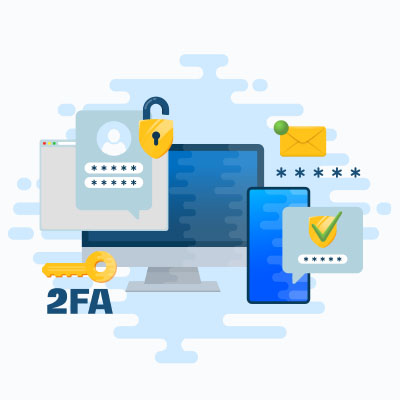 Data security is one of those things that you have to stay out in front of. Hackers and scammers are changing tactics and getting a little more sophisticated as time goes on and it creates a pretty difficult situation for most IT administrators. Utilizing multi-factor authentication (MFA), two-factor authentication, or whatever it is called by the application you are using has become a great way to add an extra layer of security to organizational data protection efforts. Today, we will discuss the benefits of this strategy and why it isn’t a be-all, end-all to your overall security.
Data security is one of those things that you have to stay out in front of. Hackers and scammers are changing tactics and getting a little more sophisticated as time goes on and it creates a pretty difficult situation for most IT administrators. Utilizing multi-factor authentication (MFA), two-factor authentication, or whatever it is called by the application you are using has become a great way to add an extra layer of security to organizational data protection efforts. Today, we will discuss the benefits of this strategy and why it isn’t a be-all, end-all to your overall security.
MFA is a technology that requires users to provide multiple forms of identification before accessing sensitive information or systems. This could involve something the user knows (password), something the user has (security token or mobile device), or something the user is (biometric data). This multi-step verification makes it significantly harder for unauthorized individuals to gain access, but as with any other password-protected account, the security isn’t 100% reliable. Let’s take a look at three major benefits.
Reduced Risk of Unauthorized Access
With traditional password-based authentication, the risk of unauthorized access is higher, especially if passwords are compromised. MFA mitigates this risk by adding an additional layer that goes beyond just relying on passwords. Even if one factor is compromised, an attacker would still need the other factor to gain access.
Protection Against Phishing Attacks
Phishing attacks often target passwords by tricking users into revealing them. MFA adds an extra barrier, as even if a user’s password is obtained through phishing, the attacker would still need the additional factor to access the account. This helps protect businesses from falling victim to phishing schemes.
Fulfilling Compliance Requirements
Many industries and regulatory bodies have established security standards that require businesses to implement robust authentication measures. MFA is often a key component of meeting these compliance requirements. Adhering to such standards not only ensures the security of sensitive data but also helps businesses avoid legal and financial consequences.
How MFA Can Be Exploited
As useful and complex as multi-factor authentication is, accounts that have it can still be exploited. Let’s take a look at a few ways hackers circumvent MFA.
Man-in-the-Middle Attacks
In a MitM attack, hackers intercept communication between the user and the authentication system. They can capture the MFA code during the transmission process which gives them immediate access to the account and any data that can be accessed by the breached user.
Sim-Swapping
By convincing a mobile carrier to transfer a victim’s phone number to a new SIM card, hackers can receive MFA codes sent via SMS. This method requires social engineering skills to trick the carrier’s customer service representative.
Credential Stuffing
Only a problem when people reuse passwords across multiple accounts, credential stuffing is when attackers obtain username and password combinations from data breaches on other sites. They can then use these credentials to access accounts, even with MFA enabled.
Using Keylogger Malware
Malware is a big problem. Malicious software can be used to record keystrokes, capturing both usernames and passwords, as well as MFA codes. As with most malware attacks, users are completely unaware that their system is infected; and, in this case, completely in the dark about their actions being monitored.
Vulnerabilities in MFA Implementation
In some cases, vulnerabilities or weaknesses in the MFA implementation itself may be exploited by attackers. This could involve flaws in the way MFA codes are generated, transmitted, or verified.
Even though we’ve taken the time to outline some of the ways hackers get around MFA-protected accounts, it is still important that you implement them on every available password-protected account. This includes logging into your workstations and laptops at the office. It gives users the best chance at keeping their data (and often organizational data) secure.
The IT professionals at Ashton Solutions can help your business get the tools you need to keep your data secure and help you set up the best strategy on each account to do just that. Give us a call at 216.397.4080 to learn more.






